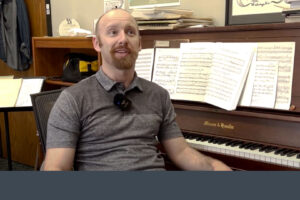Andrea Macias-Jimenez of Puebla, Mexico was nervous about coming to the Forty Acres to pursue her dream of one day working in the film industry.
“UT is such a large university so far from home,” said the Radio-TV-Film freshman. “I wasn’t sure where to begin to make friends or how to establish a network here.”
Macias-Jimenez is not alone. Each year, thousands of students arrive on campus far from parents, family and friends. Without that support network — and the fact that undergraduate life can be rife with deadlines and red tape — it’s easy to feel overwhelmed or disconnected.
For these reasons and more, it’s important for students to have a strong relationship with their academic advisor, according to Theresa Thomas, a senior academic advisor in the College of Communication Office of Student Affairs (OSA).
“Our goal is to connect students to the university, the college and their major through community building, technology and personalized advising,” said Thomas, whose department was recently named “Outstanding Advising Program” by the National Academic Advising Association (NACADA).
Thomas dishes out tips below on how her nationally-recognized advising office connects with students and helps them make the most of their undergraduate experience.
It takes a village
Although not required, all first-year students to the College of Communication are strongly encouraged to participate in one of the 25 First-Year Interest Groups, or FIGS, offered by the OSA. FIGs, many of which are tied to a major and serve to frame the first semester, are led by an academic advisor and a student. The groups meet weekly to discuss academic topics such as plagiarism and how to take advantage of the library system, as well as non-academic topics such as the top 10 places to study on campus, how to navigate Capital Metro, the best places to eat near campus, sexual health and alcohol awareness.
“I don’t know what I would have done without my FIG,” said Macias-Jimenez. “It was through my Radio-TV-Film FIG that I learned about the University Filmmakers Alliance and other film opportunities on and off campus It feels like a family away from home and it’s given me the confidence to branch out.”
The social network
While not a replacement for face-to-face interaction, technology has found a prominent role in the student-advisor relationship.
“We know that students spend a lot of time with technology — especially social media — so we try to engage with them on their turf,” said Thomas. “By using Facebook, OSA and department blogs, Twitter and instant messaging, we can quickly answer procedural questions and generally make ourselves more accessible to students.”
Check out these examples:
- Communication Studies Advising blog
- School of Journalism Advising blog
- School of Journalism Twitter account
- School of Journalism Facebook page
The technology students rave about most is the STudent Advising Resource system, or STAR, a custom online program that gives students 24X7 access to their advisor’s schedule so they can make appointments — at their convenience — without having to call, exchange e-mails or physically go to the OSA to find out whether their advisor is available to meet for 30 minutes between 1 and 3 p.m. next Tuesday.
“I use STAR to make appointments all the time,” said Veronika Joy who will graduate with a degree in broadcast journalism in May. “I can literally look at her [Thomas’s] schedule — whenever I want to — without having to jump through hoops.”
In the months to come, students, faculty and staff at the College of Communication can look forward to a number of new online services and enhancements that should further improve the student affairs experience.
Here’s lookin’ at you, college kid
Thomas and her colleagues emphasize that personalized advising is key to building strong personal relationships between students and advisors.
This personalized approach includes holding students accountable when they fall below the minimum academic standard. Advisors actively reach out to these students and require bi-weekly advising sessions. They also work with students to draw up a contract outlining required visits to campus resources, such as tutoring or time management consulting, and a minimum GPA to aspire to in the next semester.
According to Thomas, this form of intrusive advising has resulted in less than 2 percent of communication students on academic probation.



